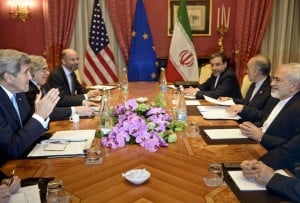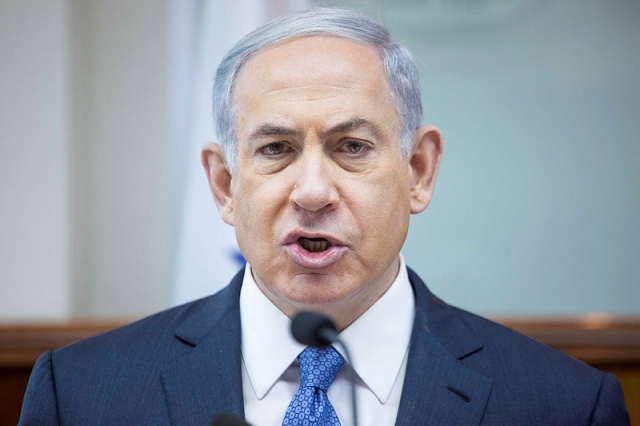Netanyahu said that the emerging deal with Iran is worse than feared, but Jerusalem has not given up on trying to block the dangerous deal.


The US and Iranian teams during on of the negotiation sessions. (REUTERS/Brendan Smialowski/Pool)
As reports continue to stream in from Lausanne, Switzerland on the progress in the negotiations regarding Iran’s nuclear program, Prime Minister Benjamin Netanyahu stated on Sunday that the emerging agreement is even worse than Israel initially estimated and feared.
After sharing about his conversations with Senate leaders Mitch McConnell and Harry Reid, who both affirmed their “strong and continuing bipartisan support for Israel.” and acknowledging the importance of their commitments, Netanyahu said that he expressed to them Israel’s deep concern over the agreement being formulated with Iran in the nuclear talks. “This agreement, as it appears, confirms all of our concerns and even more so,” said Netanyahu during the weekly cabinet meeting.
Relating to the latest upheaval and conflict in the Middle East, Netanyahu warned that “even as meetings proceed on this dangerous agreement, Iran’s proxies in Yemen are overrunning large sections of that country and are attempting to seize control of the strategic Bab-el-Mandeb straits which would affect the naval balance and the global oil supply.”
Netanyahu pointed out that Iran’s plans for regional domination through terror are becoming manifest. “The Iran-Lausanne-Yemen axis is very dangerous for humanity and needs to be stopped.”
Jerusalem Will Carry On Diplomatic Efforts


Minister Erdan. (Miriam Alster /Flash90)
Reports on the talks between Iran and the P5+1 powers indicate that the sides are very close to reaching an agreement and are working hard to iron out the final details. Israel fears what it terms a “bad deal” that would threaten Israel’s existence, regional stability and even other parts of the world. However, Jerusalem has not given up on its diplomatic efforts, even if an initial understanding is arrived at by Iran and the US by the March 31st deadline.
Speaking on IDF Radio earlier Sunday morning, Minister of Interior Gilad Eradn said that Israel still had diplomatic leeway. “It’s true that an agreement is imminent, and there is a chance that an initial agreement will be signed in the coming days. However, until the final signing of an agreement in June there is lots of room for diplomatic activity. If this does happen [an agreement is signed], Israel will have to reassess the new security status that will emerge.”

